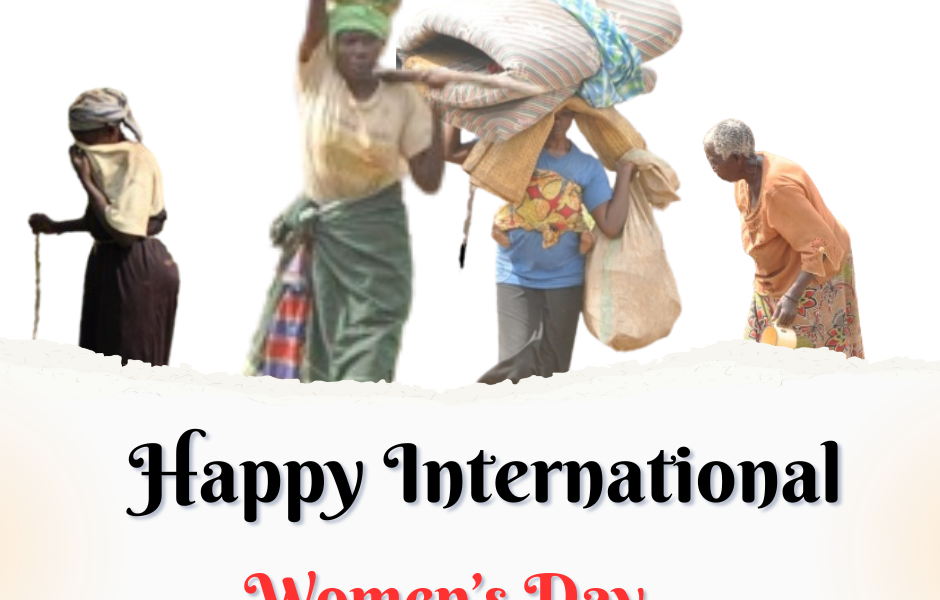STATEMENTS
Upholding Women’s Land Rights in the implementation of development projects will accelerate progress.
Published
1 year agoon
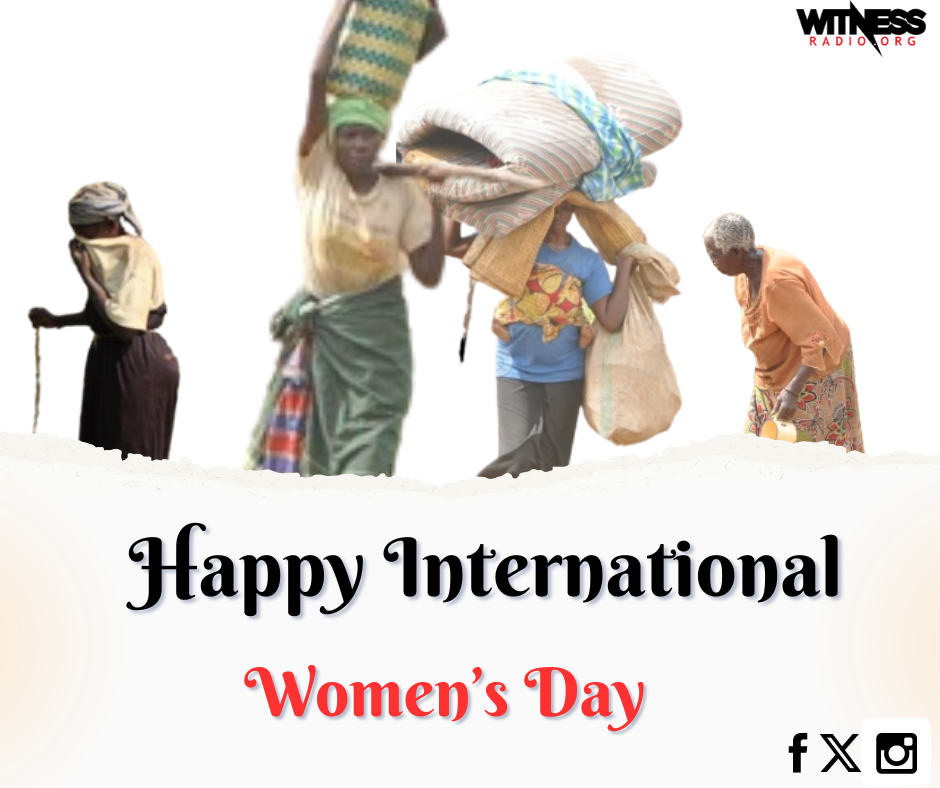
Witness Radio – Uganda Statement: On the International Women’s Day, 2024.
Upholding Women’s Land Rights in the implementation of development projects will accelerate progress.
Wakiso, Uganda. 08th/03/2024. As the world commemorates International Women’s Day 2024 under the theme “Invest in Women, Accelerate Progress” it is imperative to underscore the critical importance of safeguarding women’s human and land rights.
In Uganda, where women play a pivotal role in agricultural production and rely heavily on the land for their livelihoods, the issue of land rights emerges as a central battleground in the fight for gender equality and women empowerment.
Women in Uganda face systematic barriers when it comes to land ownership and control despite their significant contribution to agricultural productivity.
Customary norms and cultural practices often favor male inheritance and land ownership perpetrating a cycle of discrimination and marginalization against women.
This disparity leaves women vulnerable to exploitation and abuse, particularly in the context of land grabbing and eviction.
Tragically, women who assert their rights to land frequently encounter severe threats and human rights violations/abuses.
Witness Radio has documented numerous cases of violence against women smallholder farmers and women rights defenders (WHRDs), including gang rape and physical assault perpetrated by economically powerful and politically connected individuals and institutions with vested interests in land grabbing.
These egregious acts not only violate women’s rights but also perpetrate a culture of impunity and injustice.
The failure to investigate and prosecute violence against women smallholder farmers and WHRDs further exacerbates the impunity enjoyed by perpetrators, leading to more human rights abuses.
Additionally, the aftermath of land evictions often leaves women and their families vulnerable with men sometimes abandoning their responsibilities and leaving women to bear the burden alone.
At the heart of the 2024 theme lies a recognition of the pivotal role women play in driving societal progress. Investing in women encompasses various aspects, including education, healthcare, economic opportunities, and legal rights. However, securing women’s access to and control over land is equally crucial as it intersects with multiple dimensions of their lives.
When women have secure land rights, they are empowered economically and socially. Land ownership enables women to participate meaningfully in economic activities, access financial resources, and contribute to households and community well-being.
Moreover, it enhances women’s agency and autonomy, enabling them to make choices that positively impact their lives and families.
Additionally, access to land is closely linked to food security and healthcare. Secure land rights enable women to engage in sustainable farming practices, improve agricultural productivity, and ensure adequate nutrition for their families.
Furthermore, land ownership can serve as a pathway to accessing health care, thereby promoting women’s overall well-being.
However, the current legal framework governing land rights in Uganda falls short of adequately protecting women’s land rights. Biased laws and customary practices perpetrate gender disparities leaving women vulnerable to exploitation and abuse. Amending land rights is a critical step towards addressing issues affecting women about land rights and promoting gender equality.
In conclusion, protecting women’s land rights is not only a matter of social justice but also a strategic investment in accelerating progress towards gender equality and healthier lives. As we commemorate International Women’s Day 2024, let us reaffirm our community to ensure that women everywhere have equal rights to access, own, and control land resources. By prioritizing women’s land rights, we can unlock the full potential of women and girls as agents of change and drive transformative progress toward a more inclusive and equitable society for all.
Follow us on:
Website: www.witnessradio.org
Facebook: https://www.facebook.com/wradio.uganda/
Twitter: https://twitter.com/witness_radio
Related posts:
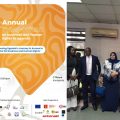
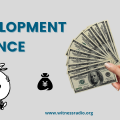 Signs of harmful projects with financing from development institutions are spotted in Uganda…
Signs of harmful projects with financing from development institutions are spotted in Uganda…
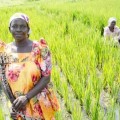 How unequal access to land by women endangers Uganda’s food security
How unequal access to land by women endangers Uganda’s food security
 Development finance for Covid-19 crisis should uphold human rights
Development finance for Covid-19 crisis should uphold human rights
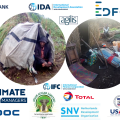 Impacts of Projects funded by Development Finances: Case series of local landlords in Ugandan that have been reduced to casual laborers.
Impacts of Projects funded by Development Finances: Case series of local landlords in Ugandan that have been reduced to casual laborers.
You may like
STATEMENTS
Witness Radio Statement on the International Human Rights Day 2024: A call to the government of Uganda to protect Land and Environmental Rights Defenders and Communities affected by irresponsible land-based investments in Uganda.
Published
7 months agoon
December 10, 2024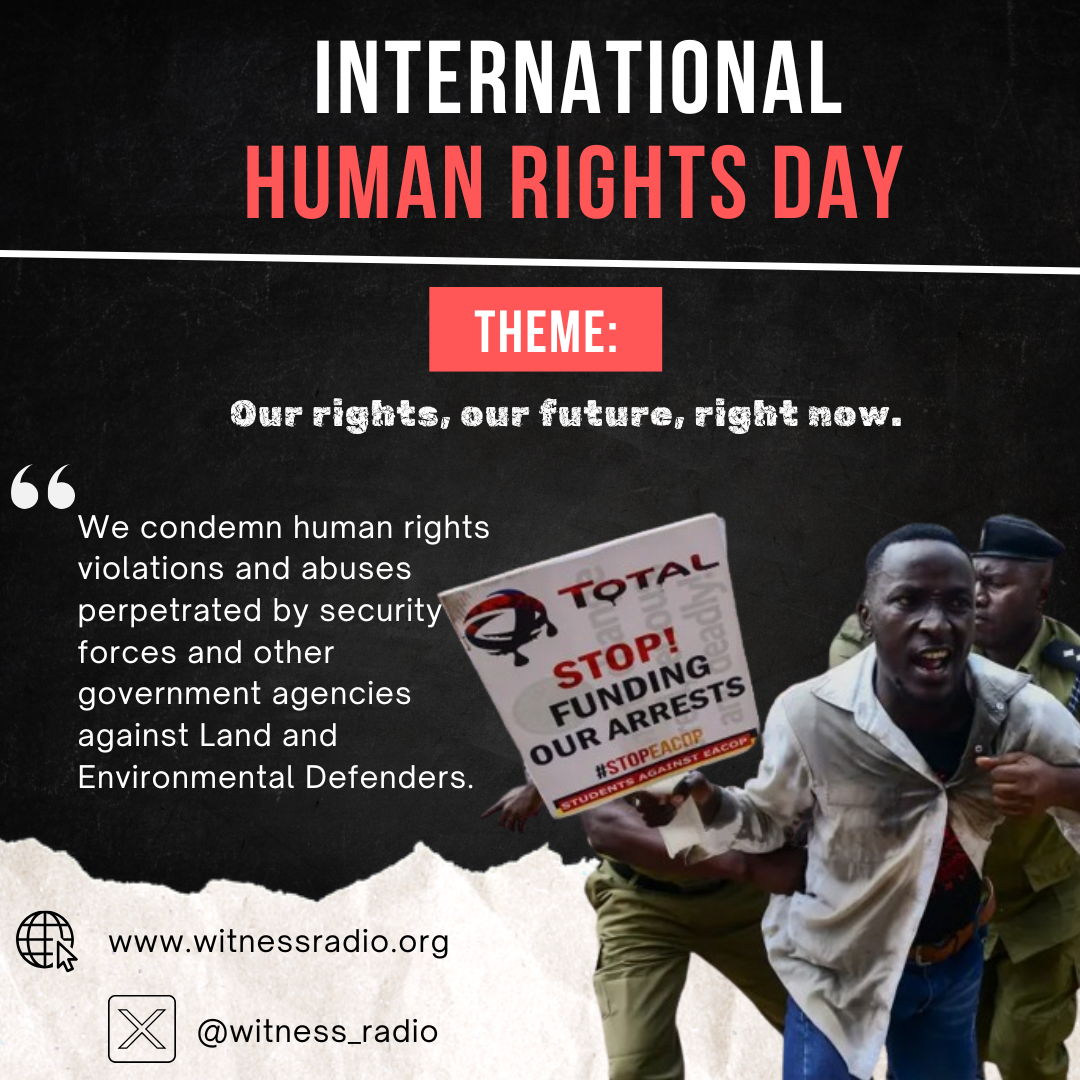
For immediate release
Statement on International Human Rights Day 2024:
Witness Radio calls out the government of Uganda to protect Land and Environmental Rights Defenders and Communities affected by irresponsible land-based investments in Uganda.
Wakiso: Uganda, December 10th, 2024; Anchored to the UN Declaration on the Right and Responsibility of Individuals, Groups, and Organs of Society to Promote and Protect Universally Recognized Human Rights and Fundamental Freedoms, Witness Radio stands together with Land and Environmental Rights Defenders, communities affected by irresponsible land-based investments in Uganda, and Human Rights Defenders across the globe in urging Government of Uganda to uphold and fulfill their obligations to protect and respect human rights in the context of land-based business operations and to ensure access to an effective remedy for individuals and groups affected by such activities, specifically land and environmental rights defenders.
As the world commemorates International Human Rights Day on December 10th, 2024, under the theme;
Our rights, our future, right now, Witness Radio has, in a period of the first 6 months of the year 2024, documented over 360,000 people who faced forceful evictions from the lands that had fed them for generations. This has led to various unbearable environmental and social issues, including violations of community rights during forceful evictions and threats to water sources, the environment, and food security. For instance, the use of agrochemicals in the newly acquired lands has led to pollution, affecting the health of the local communities.
Communities whose rights and interests on land have been forcefully transferred to land-based investors in agribusiness, carbon-offset tree plantations, oil and gas extraction, mining, and infrastructural development projects highlight concerns over food shortages, livelihoods; inadequate compensation; restricted land access; and impacts on children’s education, safety, and welfare, including gender-based violence (GBV) and reproductive health issues.
A recent report by Witness Radio Uganda, released in November 2024, paints a dire picture. Between January and June 2024, more than 360,000 people faced violent evictions, with over 121,000 hectares of land under threat. Nearly four cases of land evictions were reported weekly, affecting approximately 15,126 people and threatening 5,060.12 hectares of land across the country. An estimated 2,160 Ugandans faced evictions daily to give way to investments, with 723 hectares of land at risk of being grabbed daily. This is a crisis that demands immediate attention.
The land grabs are happening on abandoned national ranches and forests, which have long since been settled and farmed by people who came to the area fleeing war and natural calamities in neighboring areas. Although compulsory land acquisition falls within government powers in Uganda, corporations interested in specific land and their agents have been left responsible for managing much of the process and setting compensation values. This has led to serious problems with how the land acquisition process is being conducted, resulting in severe impacts on affected communities, which have infringed on the rights to property, involuntary resettlement, housing, earning a livelihood, food, private and family life, and trading and disposing of natural wealth and resources.
Land and Environmental Rights Defenders are the unsung heroes in this battle for justice. They are often the only force between ordinary people and unbridled power. However, their efforts are frequently met with judicial harassment in the form of criminalization for offensive gatherings, criminal trespass, and strategic lawsuits against public participation (SLAPPs) to discourage peaceful demonstrations against unlawful evictions, arbitrary detention, and defamation. Their importance cannot be overstated, and the injustices they face are a stark reminder of the need for change.
On this International Human Rights Day, it is crucial that duty-bearers recognize the gravity of the crisis in Uganda. The Government of Uganda should commit to and urgently implement universal respect, protection, and fulfillment of human rights for everyone and everywhere in the country. This is not just a call for action but a demand for justice and equality. We urge the government to act now, before more lives and livelihoods are lost.
Our Rights, Our Future, Right Now
Signed by;
Jeff Wokulira Ssebaggala.
For Witness Radio – Uganda
Related posts:

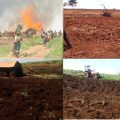 Witness Radio, private companies, CSOs and local government officials are meeting to discuss alternative remedies to salvage the appalling land and environmental rights situation in Kiryandongo district.
Witness Radio, private companies, CSOs and local government officials are meeting to discuss alternative remedies to salvage the appalling land and environmental rights situation in Kiryandongo district.
 Uganda: Land-grab victim communities will join counterparts in commemorating the 2024 International Day of Struggle Against Industrial Plantations.
Uganda: Land-grab victim communities will join counterparts in commemorating the 2024 International Day of Struggle Against Industrial Plantations.
 Land and environmental rights defenders, CSOs, scholars, and government to meet in Kampala to assess Uganda’s performance on the implementation of the UN Guiding principles on Business and Human Rights in Uganda.
Land and environmental rights defenders, CSOs, scholars, and government to meet in Kampala to assess Uganda’s performance on the implementation of the UN Guiding principles on Business and Human Rights in Uganda.
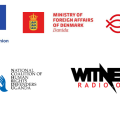 Breaking: Witness Radio and Partners to Launch Human Rights Monitoring, Documentation, and Advocacy Project Tomorrow.
Breaking: Witness Radio and Partners to Launch Human Rights Monitoring, Documentation, and Advocacy Project Tomorrow.
STATEMENTS
Breaking: There has been an alarming Rise in Forced Land Evictions in Uganda; over 360,000 Ugandans were Displaced in the First Half of 2024.
Published
8 months agoon
November 6, 2024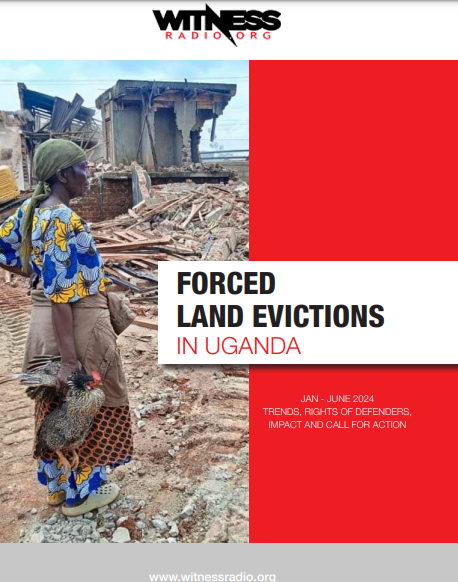
For Immediate Release:
Breaking: There has been an alarming Rise in Forced Land Evictions in Uganda; over 360,000 Ugandans were Displaced in the First Half of 2024.
Kampala, Uganda -October 5th, 2024; Witness Radio releases its mid-year report on forced land eviction, revealing a sharp increase across Uganda between January and June 2024. The report reveals staggering statistics: 90 documented land evictions have affected at least 363,021 Ugandans, with over 121,000 hectares of land under threat of being seized.
These occurrences are happening following a presidential directive on land evictions, with the majority of cases of evictions being characterized by violence, human rights violations/abuses, and total disrespect of communities’ land and environmental rights. Government security forces and private security firms and militias have been documented acting on behalf of wealthy investors and government agents and have been implicated in the use of excessive force, resulting in a series of human rights abuses, including death.
“Witness Radio is concerned about the unabated forced land evictions and foresees a large population losing its livelihood to land-based investments as the country enters a period of general elections,” Says Jeff Wokulira Ssebaggala, Country Director, Witness Radio—Uganda.
He attributed forced evictions to the government’s industrialization of Uganda’s land. This industrialization must be carefully implemented to protect smallholder farmers’ land and promote food security and sovereignty.
Key Findings:
- Attacks on Land and Environmental Defenders: In the period under review (between Jan and June 2024), 65 attacks on land and environmental defenders (LEDs) and climate activists challenging illegal land evictions and corporate harm on the environment in Uganda.
- Affected Population: Over 360,000 Ugandans were displaced, with a daily average of 2,160 people losing their livelihood. Land is targeted for oil and gas extraction, mining, agribusiness, and tree plantations for carbon offsets. While some investments have taken shape on the grabbed land, other pieces of grabbed land are still empty but under the guardship of military and private security firms.
- Land Under Threat: More than 121,000 hectares of land are at risk of being grabbed by influential investors and government agents.
- Complete Evictions: 22,962 individuals have been entirely evicted from their land, and land grabbers have fully grabbed 7,150.7 hectares of land.
- Pending Evictions: 340,059 Ugandans face imminent eviction threats, with over 114,292 hectares of land at risk of being seized.
- Regional Impact: The Central region remains the epicenter of evictions, recording 52 cases. This is followed by 24 cases in the Western region, 8 in the Northern region, and 6 in the Eastern region.
- Number of Cases documented: 90 land eviction incidents reported, affecting all regions of Uganda.
Eviction frequency.
Nearly four cases of land evictions are reported weekly, affecting approximately 15,126 people and threatening 5,060.12 hectares of land across the country.
An estimated 2,160 Ugandans face evictions daily to give way to land-based investments, with 723 hectares of land at risk of being grabbed daily.
Despite government interventions and promises to halt evictions, including directives from President Museveni, the report reveals that land grabbers frequently ignore these orders, deploying armed security forces, private militias, and police to carry out brutal evictions. Left without compensation or legal recourse, vulnerable communities are often displaced in favor of multinational corporations and influential local investors.
Case Highlights: The report details harrowing incidents like the murder of smallholder farmer Dan Ssebyala in Nakasongola, a district plagued by violent evictions involving absentee landlords and influential investors. Armed men ambushed Ssebyala following a confrontation over disputed land. This is just one of many incidents where land defenders are attacked, silenced, or even killed for opposing forced evictions.
In Kiryandongo District, security groups working for Major Taban Amin were documented torturing elected local leaders such as Councilor Fred Kangume after he opposed Amin’s illegal eviction of over 700 families. Such violent tactics have been reported as a commonly used approach to intimidate defenders and community leaders and silence opposition.
Impact on Communities:
- Food Insecurity: Evictions often destroy crops and livestock, exacerbating food shortages and malnutrition
- Loss of Livelihoods: Displaced families lose their homes and agricultural land, forcing many into poverty.
- Violence and Trauma: Communities face violence, arrests, and intimidation for defending their land, leading to physical and psychological trauma.
- Disruption of Education: Forced displacement disrupts children’s access to education as schools are often destroyed in the eviction process.
Call for Action: Witness Radio Uganda calls on the government to strengthen the enforcement of land laws, protect local communities from illegal evictions, and ensure justice for victims. Additionally, investors must adhere to international human rights standards and respect the communities they operate in. Financial institutions funding these projects must conduct thorough due diligence to prevent further human rights abuses.
For more information and to access the full report, please contact:
Mr. Tonny Katende
Research and Media Officer, Witness Radio – Uganda
Phone: +256 703085430
Email: news@witnessradio.org
Website: www.witnessradio.org
You can download a full report here: Forced Land Evictions In Uganda.
Related posts:

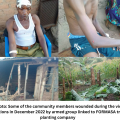 Breaking; Lands Minister directs police chief to arrest armed mobs involved in forced and illegal land evictions.
Breaking; Lands Minister directs police chief to arrest armed mobs involved in forced and illegal land evictions.
 Breaking: over 350,000 acres of land were grabbed during Witness Radio – Uganda’s seven months ban.
Breaking: over 350,000 acres of land were grabbed during Witness Radio – Uganda’s seven months ban.
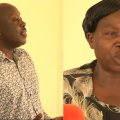 Kiryandongo leadership agree to partner with Witness Radio Uganda to end rampant forced land evictions in the district.
Kiryandongo leadership agree to partner with Witness Radio Uganda to end rampant forced land evictions in the district.
 Uganda: Land-grab victim communities will join counterparts in commemorating the 2024 International Day of Struggle Against Industrial Plantations.
Uganda: Land-grab victim communities will join counterparts in commemorating the 2024 International Day of Struggle Against Industrial Plantations.
STATEMENTS
Reflecting on Shortcomings of the World Bank’s Dispute Resolution Service
Published
11 months agoon
August 12, 2024
As civil society organizations that have supported communities around the world to use dispute resolution processes at Independent Accountability Mechanisms (IAMs), we welcome the External Review Team’s recommendations for strengthening the World Bank’s Accountability Mechanism – the Inspection Panel and the Dispute Resolution Service (DRS). This statement focuses primarily on the implementation of dispute resolution since the reforms to accountability at the World Bank added the DRS.
Several of our organizations pushed for the modernization of the Inspection Panel’s toolkit and still believe that communities should be able to access both dispute resolution and compliance review to address concerns with World Bank-supported projects. Our organizations supported the first few cases to go to DRS – Uganda: Second Kampala Institutional and Infrastructure Development Project (KIIDP-2) and Nepal: Nepal-India Electricity Transmission and Trade Project and its Additional Financing – and cases where dispute resolution was offered, Bolivia: Santa Cruz Road Corridor Connector Project (San Ignacio – San Jose) and Tanzania: Resilient Natural Resource Management for Tourism and Growth Project (REGROW). Our experience with the case handling process thus far demonstrates that meaningful changes need to be made to the Accountability Mechanism, Dispute Resolution Service, and the interaction between compliance review and dispute resolution functions. This review should result in a system that is
more respectful of communities’ agency and leads to the effective resolution of grievances.
Additionally, we agree with the ERT that a comprehensive external review should be conducted within 24-months of the effectiveness of the DRS. We have identified the following challenges that need to be addressed:
Accessibility and Requester Choice
As discussed in the External Review Team’s draft report, requesters, the very people who submit a request for accountability, should have the opportunity to clearly express their desire for the Inspection Panel to conduct compliance review and to therefore reject a dispute resolution process. In this case, the AM Secretary should not then offer a borrower government the option of dispute resolution. Doing so ignores and disrespects requesters’ agency to decide what type of accountability process to pursue, and it also puts impacted requesters at risk of retaliation from a government that has an interest in engaging in dispute resolution.
In the Bolivia case, the AM secretary offered the Bolivian government dispute resolution after the requesters had clearly rejected the option, which put the requesters at risk of retaliation and caused the Bolivian government to delay the Inspection Panel’s access to the country for a site visit. The same issue arose in Tanzania, where the government publicly expressed to the media that it will be pursuing the DR process though the requestors had clearly rejected the option. This caused great concern to the requesters, who have chosen to remain anonymous throughout the process due to fear of retaliation. They were made to believe that their names would be disclosed
and they would be forced to engage with the government, resulting in personal risks to their safety. This also added an unnecessary delay in moving forward with the investigation.
We agree with the ERT’s recommendation: The AM Secretary should offer DR not concurrently to both parties, but first to the requesters. If the requesters after 5 working days decide to proceed with the compliance investigation, they should be allowed to do sowithout any further interruption. In such a case, AM Secretary should not provide
information about DR nor offer DR to the other party.
Power Imbalances Throughout the Dispute Resolution Process.
In the Nepal and Uganda cases, we also noted several instances where the DRS and its mediators’ actions exacerbated power imbalances between the communities and the government. In the Uganda case, there were several instances where the mediators and DRS seemed to defer to the timelines and directions of the government. As discussed in a previous statement, power imbalances were especially stark towards the end of the process, where the government seemed to be directing the process of reaching and signing a final agreement and pushing desperate community members to accept any sort of deal. This situation underscored the need for the DRS to adopt a more balanced approach, ensuring that the community’s voice is equally heard and respected throughout the process. In the Nepal case, the process did not appear free and fair, with mediators appearing to favor the position of the government.
To address these issues, the DRS should implement stronger measures to manage power imbalances. This includes continuous consultations with communities, ensuring their concerns and timelines are given equal weight. Additionally, mediators should be empowered to take a firmer stance when necessary to prevent one party from dominating the process. The DRS should ensure that no single party can unilaterally determine the scope or direction of a dispute resolution meeting, and mediators should be trained to recognize and mitigate power imbalances actively.
Furthermore, the DRS should establish clear protocols to ensure that any decisions made, especially those regarding the finalization of agreements, are done with the full participation and consent of all involved parties. This includes providing ample time for community members to review and understand the terms of any agreement and offering independent legal and advisory support to help them navigate the process.
Exacerbation of Community Conflict
It is not uncommon for individual community members to have differing interests in a dispute resolution process. Mediators must be attuned to these differing interests and proceed in a manner that does not exacerbate community conflict. Unfortunately, in the Nepal and Uganda cases, the DRS and mediators exacerbated tensions in the affected communities. In Uganda, when the elected representatives agreed to terminate the dispute resolution process, the DRS still proceeded with the process with other members of the community.
In Nepal, the agreement facilitated by the DRS has created division within the community and jeopardized communal harmony. It is our perception that the DRS worked with some community members to the exclusion of others, and today, original requesters who opposed elements of the DRS-facilitated agreement or did not sign the agreement face retaliation by other members of the community, as well as by the government. Additionally, we are concerned that the DRS, in an effort to get an agreement, favored the views of community members who were not the original requesters to the Inspection Panel complaint.
Community conflict can be particularly exacerbated in circumstances where the dispute resolution process is restricted to an “All or Nothing” prospect, which increases the stakes of the process. This was unfairly the case in Nepal and Uganda where the AM Secretary refused to allow the prospect of unresolved issues transferring to the Inspection Panel for investigation, despite the fact that the final DRS procedures allow for partial agreements and for unresolved issues being transferred to the Inspection Panel. Going forward, in addition to allowing for partial agreements, we agree with ERT’s recommendation that a provision should be introduced into the AM operating procedures that requesters who originally submitted the request to IPN but then subsequently left the DR process should be given the option of proceeding with a compliance investigation after the DR agreement has been signed. The DRS outcome report should state how many of the requesters who submitted the request for registration signed the DR agreement.
Timelines for Dispute Resolution.
Although concrete timelines for IAM processes are important for ensuring predictability and facilitating the timely resolution of grievances, the strict 18-month timeline for the DRS process put undue pressure on the parties in Uganda to reach an agreement. In that case, this pressure was exacerbated by the unfair limit on partial agreements. In circumstances where communities are negotiating with powerful governments, the pressure to reach any agreement, even if it doesn’t fully address grievances, is made even more stark as the deadline approaches.
We agree with the ERT report’s recommendation to allow for timeline extensions to 20 months, though there may be circumstances where even more time could be constructive.
The 24-month review of the DRS should further explore the timelines issue and what additional flexibility is needed.
Transparency.
As discussed by the ERT’s draft report, the DRS falls far behind other independent accountability mechanisms on the transparency of DR agreements. Again, given power imbalances, transparency of agreements helps keep the parties accountable to the agreement and is important for institutional accountability. In our experience, the DRS seems to confuse transparency of the overall agreement with transparency of commitments to particular individuals (such as compensation amounts), which individuals might prefer to have kept confidential. We agree with the ERT draft report’s recommendation that reporting should specify the issues to which the parties have agreed and those to which they have not.
We are also concerned that the DRS has no fair and predictable process in place for how decisions on confidentiality of agreements should be reached in the first place. In the Uganda case, the decision to keep the specific terms of the agreement confidential was made in the final few days of the negotiations, without some requesters’ involvement and without involvement of requesters’ advisors. Again, given power imbalances, it’s obvious that some communities will
feel pressured to agree to confidentiality of an agreement even when it is against their best interests. We call on the 24-month review to evaluate how these decisions have been reached in practice.
Monitoring
Reaching an agreement is just one step of ensuring the full resolution of grievances. Active monitoring of the full implementation of the agreement is crucial to ensure that each commitment in the agreement is fulfilled in a meaningful way. For cases so far, the DRS has not been transparent about what monitoring–if any–it does. As advisors to the communities in Nepal and Uganda, we have asked for status updates on the agreements’ implementation, and the DRS has not provided us with answers sufficiently. The DRS has at times ignored our requests and at others have offered vague and incomplete answers. The ERT draft report recommends a full
substantive conclusion report after the DRS concludes monitoring. We agree and also call for the DRS to issue interim monitoring reports, drafted in consultation with the parties, so that there will be more transparency into the implementation of the agreement, and course correction can happen if need be.
Role of the Accountability Mechanism Secretary
As we reflect on the shortcomings of the World Bank Accountability Mechanism’s dispute resolution processes thus far, we see the scope and mandate of the Accountability Mechanism Secretary to have contributed to the problems. The root of the problem is the 2020 board resolutions, which establish the AM Secretary position. The board resolutions list a mix of roles for the AM Secretary, which range from substantive to administrative: For example, being tasked with offering dispute resolution to parties and drafting the report transferring a case from DR to
the Inspection Panel on one hand, and overseeing the Inspection Panel’s resources on the other hand.
In practice, it has felt to us that the AM Secretary is more or less acting as the head of the dispute resolution process, with a surprisingly high level of involvement in the Uganda and Nepal cases. For example, the AM Secretary’s decision to restrict the option of unresolved issues going to the Inspection Panel and as well as the problematic offers of dispute resolution in the Bolivia and Tanzania cases.
This presents at least an appearance of a conflict of interest, and perhaps a real one, where the face of the overall Accountability Mechanism is also partial to the dispute resolution process and has an interest in seeing as many cases go to DR and reach an agreement as possible.
The ERT’s draft report should have considered whether the role of the AM Secretary should exist at all and if so, what its mandate should be. We consider the role to be largely redundant and thus would support the elimination of the role. Of the options proposed by the draft report, we prefer Option 3, which would split the Inspection Panel and the DRS into separate entities. We expect that this option would make the AM Secretary role unnecessary.
Additional issues for the 24-month Review
The issues above are non-exhaustive, and the 24-month review of the DRS should comprehensively examine other issues affecting dispute resolution at the Bank, including:
- Selection of mediators
- Development and signing of a framework agreement
- Respecting the role of representatives and advisors
- DRS support for studies and experts to support the dispute resolution process
- Communication with parties
- Perceptions of partisanship of the DRS toward government parties
- Information sharing, access to information, and fact finding
- Retaliation management
- Role of the Accountability Mechanism Secretary in dispute resolution processes
- Coercion of parties to sign dispute resolution agreements
- Introduction of new participants at the signing of agreements
- Effects of the DRS process on local judicial processes and other avenues for justice
Conclusion
We again commend the World Bank Board for initiating this review of the accountability system at the World Bank and the External Review Team for its examination of some of the challenges with the system so far. As advisors to communities who have used the mechanism, we stand ready to provide additional insights into the implementation of the ERT’s recommendations and the review of the DRS. We hope to soon see a system that better respects community agency and better facilitates justice.
Sincerely

Witness Radio
Accountability Counsel
Bank Information Center
Lawyer’s Association for the Human Rights of Nepal’s Indigenous Peoples (LAHURNIP)
Oakland Institute
Supporters
Bretton Woods Project
Buliisa Initiative for Rural Development Organisation
CEE Bankwatch Network
Fundeps
Green Development Advocates*
International Accountability Project
Jamaa Resource Initiatives
Lumière Synergie pour le Développement
MenaFem Movement for Economic Development and Ecological Justice
Oyu Tolgoi Watch
Peace Point Development Foundation-PPDF
Rivers without Boundaries
* Supporting communities in the Cameroon:
Supporting communities in the Cameroon: Nachtigal Hydropower Project (P157734) and Hydropower Development on the Sanaga River Technical Assistance Project (P157733) case.
Previous Statements:
One Year Later, Justice is Delayed: A joint statement on the implementation of the KIIDP-2
Breaking Alert: Barely a year after signing the remedy agreement, World Bank Project-Affected
Persons (PAPs) receive fresh land eviction threats
World Bank Under Fire: Investigation Launched into Bank Financed REGROW Project in Tanzania
Redefining Impartiality: Advocating for a Community-Centered Approach to Accountability Mechanisms
Related posts:
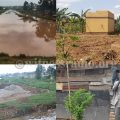
 World Bank extends the Lubigi drainage project dispute resolution process for another six months.
World Bank extends the Lubigi drainage project dispute resolution process for another six months.
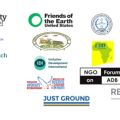 Joint Statement on World Bank Accountability Mechanism’s Decision to Limit Application of Operating Procedures
Joint Statement on World Bank Accountability Mechanism’s Decision to Limit Application of Operating Procedures
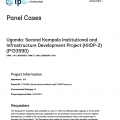 Witness Radio – Uganda and partners welcome a public acknowledgment of the complaint lodged before the World Bank’s Inspection Panel.
Witness Radio – Uganda and partners welcome a public acknowledgment of the complaint lodged before the World Bank’s Inspection Panel.
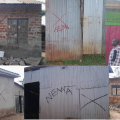 Breaking Alert: Barely a year after signing the remedy agreement, World Bank Project-Affected Persons (PAPs) receive fresh land eviction threats
Breaking Alert: Barely a year after signing the remedy agreement, World Bank Project-Affected Persons (PAPs) receive fresh land eviction threats

Activism on Trial: Despite the increasing repressive measures, Uganda’s EACOP protesters are achieving unexpected victories in the country’s justice systems.

Communities Under Siege: New Report Reveals World Bank Failures in Safeguard Compliance and Human Rights Oversight in Tanzania

A decade of displacement: How Uganda’s Oil refinery victims are dying before realizing justice as EACOP secures financial backing to further significant environmental harm.

Carbon Markets Are Not the Solution: The Failed Relaunch of Emission Trading and the Clean Development Mechanism

A decade of displacement: How Uganda’s Oil refinery victims are dying before realizing justice as EACOP secures financial backing to further significant environmental harm.

Govt launches Central Account for Busuulu to protect tenants from evictions

Activism on Trial: Despite the increasing repressive measures, Uganda’s EACOP protesters are achieving unexpected victories in the country’s justice systems.

Despite harsh repression, opposition to the EACOP pipeline in Uganda remains strong

Innovative Finance from Canada projects positive impact on local communities.
Over 5000 Indigenous Communities evicted in Kiryandongo District
Petition To Land Inquiry Commission Over Human Rights In Kiryandongo District
Invisible victims of Uganda Land Grabs
Resource Center
- LAND GRABS AT GUNPOINT REPORT IN KIRYANDONGO DISTRICT
- RESEARCH BRIEF -TOURISM POTENTIAL OF GREATER MASAKA -MARCH 2025
- The Mouila Declaration of the Informal Alliance against the Expansion of Industrial Monocultures
- FORCED LAND EVICTIONS IN UGANDA TRENDS RIGHTS OF DEFENDERS IMPACT AND CALL FOR ACTION
- 12 KEY DEMANDS FROM CSOS TO WORLD LEADERS AT THE OPENING OF COP16 IN SAUDI ARABIA
- PRESENDIANTIAL DIRECTIVE BANNING ALL LAND EVICTIONS IN UGANDA
- FROM LAND GRABBERS TO CARBON COWBOYS A NEW SCRAMBLE FOR COMMUNITY LANDS TAKES OFF
- African Faith Leaders Demand Reparations From The Gates Foundation.
Legal Framework
READ BY CATEGORY
Newsletter
Trending
-

 SPECIAL REPORTS AND PROJECTS4 days ago
SPECIAL REPORTS AND PROJECTS4 days agoActivism on Trial: Despite the increasing repressive measures, Uganda’s EACOP protesters are achieving unexpected victories in the country’s justice systems.
-

 NGO WORK1 week ago
NGO WORK1 week agoCommunities Under Siege: New Report Reveals World Bank Failures in Safeguard Compliance and Human Rights Oversight in Tanzania

